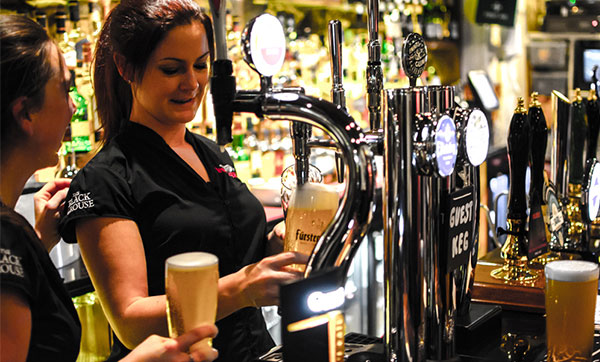Give Yourself the Edge: What Managers are Looking for on a Trial Shift?
Friday, July 10, 2015

So you have secured a trial shift in a couple of days and you don’t have much time to prepare – what to practice, what will you need to know, what’s in an espresso martini – will I have to make one, and that is before you have even started that uni-assignment….. doh!!!
Don’t stress too much – they have given you the opportunity to do a trial shift not because of your world-class bar experience and drinks knowledge; but because they actually like you. Yes - You! The other stuff, the world-class beer pouring can all be trained later, once you get the job. Your personality and people skills can’t be trained – that’s why you got the trial over someone else.
Don’t put your feet up just yet – there are some other important aspects an employer will be looking out for on your trial that you can mentally prepare for. Lets take a look at these below:
1) Be on time and be prepared:
Arrive fifteen minutes before the start of your trial start time given to you by your interviewer. Follow their instructions as, and if any were given. If it is busy when you arrive, wait till the customers have been served before making contact with the bar staff. Stand out of the way of customers so the staff can do their job efficiently. This is a good sign of common sense. Be prepared – cleanly dressed as instructed or if unsure black pants, black button up shirt and black leather closed in shoes are an industry standard & will have you looking sharp. Remember to have your hair neatly done, tied back for girls and cleanly shaved for boys. Remember a wine knife. Being prepared and organised will follow on through in your work ethic. Organisation = efficiency = faster customer service.
2) Know the products:
Before you go to your trial take 20 minutes to read the drinks and food menu. Drinks – know what are the main local and international beers they offer, do they have cider (this is an in-trend item at the moment), what wines by the glass do they offer. In your fifteen minutes early arrival, scout out where things are located in the bar. Food – what type of menu is it? Do they have snacky items, share plates or bar meals? If you were going to eat there – what would you order? What times is the kitchen closed? Knowing this at the outset will demonstrate you are serious about the job and will set you streets ahead of other trials coming in. Product knowledge = informative customer service + sales + tips for you = happy boss.
3) Prioritise & common sense:
I have put these two characteristics together as they both go hand in hand. Prioritising simply means - what is the most important thing I could be doing right now? If there are customers in front of you – it is attending to customers. Common sense means serving those customers waiting the longest first.
Prioritising also plays a hand in which drinks you make first for the customer – always pour beers last when making multiple drinks, so the beer head presentation is at an optimum when served. Once the customers are served, attend to the areas in which customers enjoy those drinks – the differing venue areas (remember to tell someone where you are going so that the bar is always staffed).
- Do tables need wiping down?
- Do coasters need changing?
- Does the cutlery station need restocking?
- Are the floors clean and spill free?
- Do the tables and chairs look orderly and evenly spaced?
- Has anyone checked the toilets?
If the customers have all been served, the patron venue areas are well maintained, our next priority is stocking the bar – things like lemons and limes, ice, glassware, our top selling beverage items (house spirits, wines wine the glass and local and international beers). Its time to get these stocked ready for the next wave of customers. These should be your key three priorities when working the bar – if you are unsure of what to do – ask your supervising staff member. Remember you are getting paid by the hour – the more you accomplish in that hour, the better value you are providing the venue. Staff that can prioritise and have common sense can be better trusted to do a job by managers, meaning less training and supervision is required, and they can get on with other more important management tasks.
4) Work ethic:
When working in a bar, especially if new to bartending, there are some industry basics that picking up earlier will make both your life easier and for those that you work with. These basics are listed below:
a. Put things back where they go every time you use them. Put them straight back after use – the vodka, the muddling stick, the tab card holder, the Boston cocktail shakers (after a quick rinse under hot water of course), even the roster when you sign out. Doing this will ensure that all staff members can access equipment quickly when serving customers, especially when it is busy. More experienced staff and customers will get irritated very quickly if they have to go looking for things to make drinks. Get into this good habit as quick as possible.
b. Notify co-workers when you are behind them – either a quick tap on the back or “behind”. Doing this will ensure the bar is accident free and produce won’t be wasted from avoidable mishaps.
c. Constantly clean as you go while you work. Wipe up spills, maintain the top of the bar – dirty glassware, wet coasters, replenish straws, glassware racks, the speed rail where your house spirits are stored, the fridges, wipe bottles – anything that can be seen, keep it clean!! This will lead to both efficient use of time and efficient customer service. Both of these will lead to more shifts for you with more customers to serve.
d. If you have done all of the above then you are doing well – but I want you to work faster. The last hospitality standard I will share with you is to work with a sense of urgency. Be clean, be organised, put things back where they go – yes – but do it with a hustle. This will lead to higher productivity, faster customer service and more revenue for the business and shifts for you. If you don’t do this, other people that do, will get the shifts.
Remember, they have offered you a trail because they already like you. If you can put into practice these items discussed in this article, they are going to like you even more. Putting these industry basics into practice on your trial shift is going to give you an inside edge over your competition going for the job. Doing these basics right at the outset takes a load of the hiring managers shoulder – as it will mean you require less training and supervision – and that you will be able to transition quicker into the workplace with more ease. They won’t waste the time training you in the other stuff you don’t know – like the espresso martini and what is in a vodka, lime and soda – if you don’t display these key industry standards at the outset. Take this advice and apply it on your trial......... and don’t forget that assignment.
Check out all our hospitality courses to keep upgrading your credentials.




